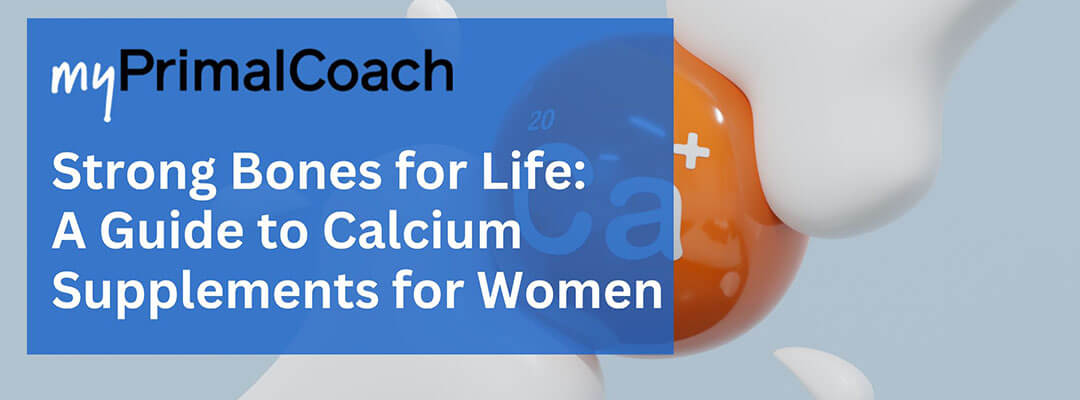Calcium supplements for women offer a convenient way to help bridge nutritional gaps and support strong bones, healthy muscles, and overall well-being at every age. The importance of calcium becomes even more pronounced as women navigate different life stages. Calcium is required for building teeth and strong bones in childhood to preventing osteoporosis in post-menopausal women. However, many may find it hard to meet their daily requirements through food alone, making calcium supplements an attractive option for women.

Calcium supplements for women can help keep bones strong and healthy.
Before running to the vitamin store, let’s first explore calcium’s role in the body and the benefits and potential side effects of calcium supplementation for women.
What Is Calcium?
Calcium is an essential mineral vital for numerous bodily functions. Essential means you must get it from food or supplements, as the body is not able to make it. Most notably, calcium is essential for the development and maintenance of strong bones and teeth—you can't build either without it.
Beyond its skeletal role, calcium plays a part in muscle contraction and enabling movement. It helps with nerve transmission and allows for communication between the brain and the rest of the body. Calcium is also essential for proper blood clotting, preventing excessive bleeding after injury. When dietary intake is insufficient, the body leaches calcium from the bones. When chronic, this can lead to weakened bones and an increased risk of fractures, especially hip fracture risk in women, over time.
Why Women Need Calcium
A woman's calcium needs change throughout her life. Women need higher levels during periods of increased demand, for example:
- During adolescence, rapid bone formation requires peak levels of calcium to build strong bones and fortify bone mass.
- Pregnancy and breastfeeding require calcium to support their baby’s development.
- Throughout adulthood, women need moderate amounts of calcium to maintain existing bone health.
- After menopause, women have a significantly higher risk than men of developing osteoporosis. This increased risk is primarily due to hormonal changes, primarily the decline of estrogen. Estrogen plays a pivotal role in maintaining bone density. When levels drop, bone loss accelerates and women require a higher level of calcium to counteract it. Adequate calcium intake is essential for women to maintain strong bones and reduce the risk of osteoporosis later in life.
Situations When Calcium Supplements for Women May Be Necessary
Calcium supplements for women may be necessary when dietary intake is insufficient. This is particularly true for those who avoid eating dairy. Women who are lactose intolerant, have dairy allergies, follow vegan diets, or have limited access to nutritious food may need a supplement.
Certain life stages will also increase calcium requirements. Calcium supplementation is potentially beneficial during adolescence, pregnancy and breastfeeding, and post-menopause.
Additionally, certain digestive disorders and the use of specific medications can affect calcium absorption or increase calcium loss. Women diagnosed with osteoporosis will likely be advised by health professionals to take calcium supplements as well.
Types of Calcium Supplements for Women
There are several types of calcium supplements for women available. While most often found as tablets, there are also calcium gummies and liquid calcium. Each contains different calcium compounds. The two most common types are:
- Calcium carbonate: This is the most common and generally the most affordable type of calcium supplement. It contains a high amount of elemental calcium (40 percent), which means the form of calcium your body can actually use. Calcium carbonate requires stomach acid for proper absorption, so it's best taken with food. Some over-the-counter antacids contain this form of calcium.
- Calcium citrate: This form of calcium is more easily absorbed than calcium carbonate, even on an empty stomach. This makes it a good option for people with low stomach acid, such as older adults or those taking acid-reducing medications. Calcium citrate contains less elemental calcium (21 percent) than calcium carbonate.
Other less popular forms of calcium supplements for women include:
- Calcium gluconate: Contains about 9% elemental calcium.
- Calcium lactate: Contains about 13% elemental calcium.
- Calcium phosphate: Contains about 38% elemental calcium, depending on the specific form.
Benefits of Calcium Supplements for Women
The primary benefit of calcium supplements for women is as a bone health supplement. Supplements can help support bone mass and reduce the risk of osteoporosis. This is particularly important for women post-menopause.
Beyond bone health, there is some research suggesting other potential benefits of calcium supplements for women. These include:
- Reduced risk of colon cancer: Some research indicates a possible link between calcium intake and a reduced risk of colorectal cancer, but more research is needed to confirm this.
- Blood pressure benefits: Some studies suggest that calcium may play a role in regulating blood pressure, but the evidence is mixed.
- Managing PMS symptoms: Some women find that calcium supplements can help alleviate symptoms of premenstrual syndrome, such as mood swings and cramping.
- Weight loss: Some studies suggest a possible link between calcium intake and weight management. There is also evidence of a reduced risk of metabolic syndrome, though more research is needed.
Risks and Side Effects of Calcium Supplements for Women
While the supplement form of calcium comes with benefits for women, it's important to be aware of potential risks and side effects:
Common Side Effects:
- Constipation: This is one of the most common side effects. It’s especially something to look out for with calcium carbonate supplements. Increasing your fiber intake and drinking plenty of fluids can help alleviate constipation.
- Gas and bloating: Some women may experience gas, bloating, or stomach upset after taking calcium supplements.
- Indigestion: Calcium supplements can also cause indigestion or heartburn in some women.
Potential Risks:
Here are some of the main risks associated with calcium supplements for women:
- Kidney stones: A high calcium intake, especially from supplements, can increase the risk of developing kidney stones in susceptible women.
- Hypercalcemia (high blood calcium): Taking large amounts of calcium supplements can lead to elevated calcium levels in the blood. This can cause symptoms like nausea, vomiting, weakness, and confusion. In severe cases, hypercalcemia can lead to kidney damage and serious complications.
- Potential cardiovascular risks: There is some research noting a possible link between calcium supplements and an increased risk of heart disease or heart attack. Some studies have suggested a potential correlation, while others have not found a significant link. More research is needed on this topic.
Other Things to Consider:
- Interactions with medications: Calcium supplements can interact with certain medications. Antibiotics, thyroid medications, and some medicines used to treat osteoporosis can be contraindications. It's important to inform your healthcare provider about all of the medications and supplements you are taking.
- Dosage: It's important to stick to the recommended dosage of calcium supplements and not exceed the upper tolerable intake level.
Food Sources of Calcium
It's always ideal to obtain calcium primarily through dietary sources whenever possible. Food sources of calcium are generally more effectively absorbed and come with less risk of side effects. Calcium is found in the following primally-aligned food sources:
Non-Dairy Sources
- Fortified almond milk or other plant-based milks.
- Leafy green vegetables: Kale, collard greens, spinach, and bok choy contain calcium, although the bioavailability (how well your body absorbs it) can be lower than from dairy.
- Canned fish with bones: Sardines and canned salmon with bones.
- Nuts and seeds: Almonds, chia seeds, and sesame seeds.
Dairy Products
- Cow's milk, goat's milk, and sheep's milk.
- Plain yogurt, especially Greek yogurt.
- Hard cheeses like cheddar, parmesan, and Swiss.
Tips for Increasing Calcium Intake:
- Choose a variety of calcium-rich foods: This helps ensure you get calcium from different sources and also provides other essential nutrients.
- Pair calcium-rich foods with vitamin D: Vitamin D helps your body absorb calcium. Many calcium supplements for women contain vitamin D for this reason. The most abundant source of vitamin D Good food sources of vitamin D include sunlight and fatty fish like salmon. Maintaining adequate vitamin D levels and avoiding vitamin D deficiency is critical for bone health.
Summary
Bone health is an essential aspect of overall health and well-being for women at every stage of life. A balanced diet rich in calcium-rich foods should be the foundation. However, calcium supplements can play a supportive role when dietary intake is insufficient or a woman's needs are increased.
By understanding the importance of calcium, and the benefits and drawbacks of supplementation, women can take proactive steps to maintain strong bones, reduce the risk of osteoporosis, and support their long-term health. A myPrimalCoach is ready to help you recognize your individual needs and how to incorporate calcium-rich foods into your diet.
Remember to always consult with a healthcare professional to determine the best form of calcium, any potential health conditions and health risks, and your appropriate dosage.

